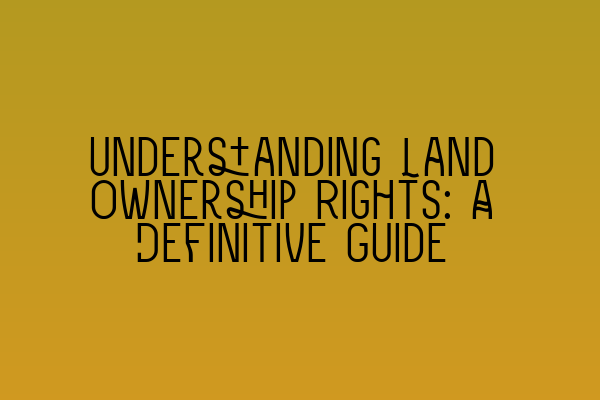Understanding Land Ownership Rights: A Definitive Guide
As a property law firm, SQE Property Law & Land Law is dedicated to providing expert advice and assistance to individuals, businesses, and organizations when it comes to matters of land ownership rights. In this definitive guide, we aim to shed light on the complexities of land ownership rights, helping you navigate through the legal framework surrounding property ownership.
Before we dive into the intricacies, it’s essential to grasp the basic concept of land ownership rights. Land ownership refers to the legal rights an individual or entity has over a specific piece of land. These rights include the right to possess, use, transfer, and exclude others from the land. Understanding your land ownership rights is crucial for ensuring the proper management and protection of your property.
1. Types of Land Ownership Rights
There are several types of land ownership rights that you should be aware of:
a. Freehold Ownership: Freehold ownership grants the highest form of ownership, giving you full and indefinite rights over the land and any structures on it. However, certain restrictions may still apply based on local laws and regulations.
b. Leasehold Ownership: Leasehold ownership, on the other hand, gives you the right to occupy and use the land for a specified period of time, usually through a lease agreement with the freeholder. Leasehold ownership is commonly seen in commercial properties and residential apartments.
c. Joint Ownership: Joint ownership occurs when two or more individuals hold equal or unequal shares in a property. This can include ownership through tenancy in common or joint tenancy, each carrying different rights and responsibilities.
2. Acquiring Land Ownership Rights
There are various ways to acquire land ownership rights, including:
a. Purchase: The most common method of acquiring land ownership rights is through purchase. When you buy a property, you become the legal owner and possess all the associated rights and responsibilities.
b. Inheritance: Land ownership rights can also be acquired through inheritance when a property is passed down from one generation to another. In such cases, it is crucial to understand inheritance laws and seek legal advice to navigate any complexities that may arise.
c. Gift: Land ownership rights can be gifted by a current owner to another individual or entity. This can be done through legal documentation, ensuring a smooth transfer of ownership.
3. Land Registration and Title Deeds
Land ownership rights are often evidenced by title deeds, which serve as legal documents proving ownership. Registering the land and obtaining a title deed is essential to establish clear ownership and protect against fraudulent claims or disputes.
In the United Kingdom, land registration is typically done through the Land Registry. Registering your land provides you with an official record of your ownership rights and offers greater protection against third-party claims.
4. Restrictive Covenants and Easements
When it comes to land ownership, it’s crucial to consider any restrictive covenants or easements that may affect your rights.
a. Restrictive Covenants: Restrictive covenants are legal agreements that impose certain restrictions on how a property is used or developed. These restrictions may limit building height, restrict business activities, or require certain aesthetic guidelines to be followed.
b. Easements: Easements grant specific rights to individuals or entities that are not the landowner. Common easements include the right of way, granting someone access to cross another’s land, or the right to use another’s land for drainage or utilities.
Understanding the presence and implications of restrictive covenants and easements is crucial to avoid any legal complications or conflicts with neighboring landowners.
5. Legal Disputes and Resolving Issues
Unfortunately, disputes can arise in matters of land ownership. Whether it’s a boundary dispute, breach of restrictive covenants, or an easement disagreement, seeking legal advice is essential to protect your rights and resolve these issues effectively.
At SQE Property Law & Land Law, our experienced solicitors are well-versed in land ownership law and can provide expert guidance and representation in legal disputes. Our team’s in-depth knowledge of property law allows us to navigate through the complexities and find favorable resolutions for our clients.
In conclusion, understanding your land ownership rights is crucial for ensuring the proper management, protection, and enjoyment of your property. By familiarizing yourself with the different types of land ownership, acquisition methods, documentation, and potential complications, you can confidently and efficiently navigate the world of property ownership.
For more information on related topics or to access useful resources, please check out our related articles:
– SQE 1 Practice Exam Questions
– SQE 1 Practice Mocks FLK1 FLK2
– SQE 2 Preparation Courses
– SQE 1 Preparation Courses
– SRA SQE Exam Dates
If you require further assistance or have specific questions regarding land ownership rights, don’t hesitate to reach out to our team of dedicated solicitors. We are here to provide you with comprehensive legal advice and support on all matters related to property law.
